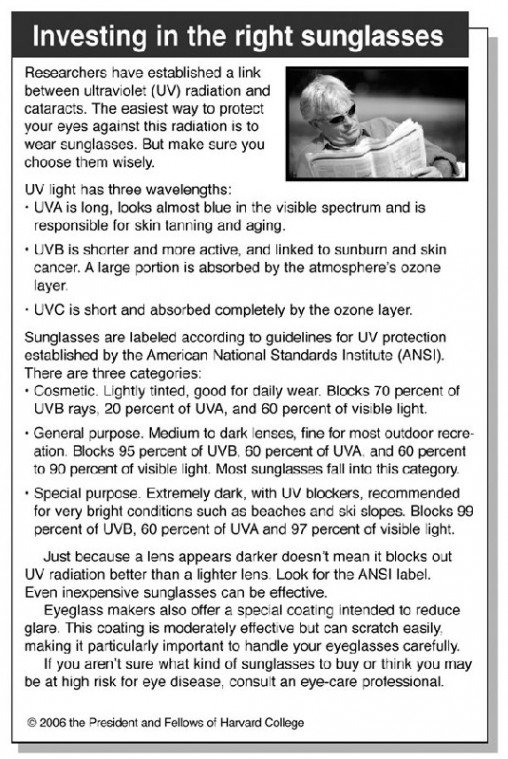Q: Are there ways to help prevent cataract?
By The Faculty of Harvard Medical School
Q: Are there ways to help prevent cataract?
A: Yes, there are things you can do to lessen your chances of developing a cataract in the lens of your eye. First, some background: Your eye’s lens is a tiny magnifying glass about the size and shape of an M&M. In children, the lens is crystal clear. But, as you age, the lens tends to get cloudy or to form dark spots that interfere with light getting into your eyes. That’s a cataract. The change in the lens is similar to what happens when you cook an egg white as it changes from clear to opaque. Eventually, a cataract can cause problems with sight.
Cataract occurs in about half of all people ages 65 to 74 and in about 70 percent of those older. Between ages 52 and 64, you have a 50 percent chance of having cataract. But according to the American Academy of Ophthalmology, the cataract usually won’t cause problems until you are about age 65. Each year, about 1.5 million cataract surgeries are done in the United States, making it one of the most common operations in the country.
Contrary to what many people believe, cataract is not caused by cancer, or by a film blanketing the eye. It is not related to overuse of the eyes, and it does not spread from one eye to the other. But you can develop cataracts in both eyes.
Age is the factor most likely to cause cataract. But other factors such as heredity, eye injuries, and the use of some medications (particularly corticosteroids), can make people more prone to cataracts. The same is true for certain health problems, such as diabetes.
Another possible cause of cataract is sunlight. Studies have found that people who live where it’s sunny most of the time are more likely to develop cataracts. And cataracts tend to be more common in people who work outdoors most of their lives, according to one study. To protect your eyes against the sun’s harmful rays, chose your sunglasses wisely (see graphic).
Although you may have heard that certain vitamins can help prevent cataract, the evidence is a bit murky.
One study suggested that men who take multivitamins are less likely to develop cataract and to have cataract surgery. Other reports found a lower rate of cataract in people who took vitamin E, vitamin A and beta carotene (a substance the body uses to make vitamin A). However, a more recent study found that high-dose supplements of vitamin C, vitamin E, beta carotene and zinc had no effect on the development of cataract. The evidence is not strong enough to recommend that everyone take antioxidant supplements.
In the meantime, eating plenty of vitamin-rich fruits and vegetables – especially spinach and other dark green vegetables – may lessen your chance of developing cataract.
Cataract is painless and progresses slowly. Your vision usually turns blurry or dim, and glare from lights and the sun becomes especially distressing.
You may experience double vision, as well as a distorted image. You may find it harder to see well at night, and colors appear duller. Because most cataracts develop very slowly, people don’t understand what is wrong until their vision grows worse, prompting them to seek frequent changes in their eyeglass or contact lens prescription. But corrective lenses cannot improve the problems caused by cataract.
Anyone who experiences blurred or dim vision, or bothersome glare in bright sunlight or with bright lights at night, should visit an ophthalmologist immediately for a full examination. The eye care professional will test the sharpness of your vision and will probably dilate your pupils with drops. By examining the interior of the eye with a slit lamp, the doctor can see any cataract and assess just how extensive the cloudy patches are. Additional examinations and tests help rule out the possibility of other eye disorders.
Submit questions to the Harvard Medical School Adviser at www.health.harvard.edu/adviser. Unfortunately, personal responses are not possible.













